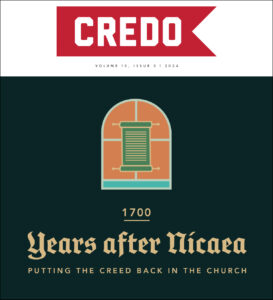When I began my seminary education, I must admit that I gave very little thought to the Nicene Creed. I knew somewhere in the back of my mind that it existed and that it was, perhaps at one time, important to some people. However, as someone who is far along in his theological education, I am embarrassed that its significance to our theological heritage did not influence my motivation for seminary. “We believe,” credo in unum Deum, belongs as much to the seminary student as to the laity because the faithful seminary student is also a faithful church member. Click To TweetBut then again, how often does it do so for anyone? I am not sure it does so frequently; at least it does not in Baptist circles. On the surface, it seems difficult to find a reason as to why or how a 4th-century creed should have an impact on seminary students. The Creed, if it plays a role at all in the life of a believer, does so in the church, as part of a weekly corporate confession, or as a creedal standard to which the church and its elders are accountable. However, it is precisely there within the church that the Creed finds its significance for the seminary: seminaries exist for the church to train theologians and pastors. The often disparaged divide between the church and the academy can, in part, be mended by church members on the one hand and seminary students, on the other, holding fast to the faithful confession of the “one, holy, catholic, and apostolic church.” “We believe,” credo in unum Deum, belongs as much to the seminary student as to the laity because the faithful seminary student is also a faithful church member. So, I will give three reasons why the Nicene Creed is and should be a necessary influence for the seminary student.
First, the Nicene Creed orients our hearts toward the proper ordering of theology. John Webster is right to say that “theology is the study of God and all things in relation to God.” This is the irreversible “material order of theology.” In other words, when we study theology in seminary, the first thing we should pay attention to is what we believe about God, His nature, and His existence. Only once we have a firm grasp of who God is, in His Triune perfection, can everything else in relation to God come into right focus. Whatever else we may learn about creation, salvation, history, or eschatology, all of it is warped in some way if we do not understand who God truly is. Seminary is not a time to create your own doctrine of God, nor is it the job of the seminary to create one. Rather, both the seminary and the student should be bound to teach and learn the proper Theology Proper according to the Word of God. The Nicene Creed, while not a robust dissertation on Theology Proper, distills true Theology Proper into creedal form as a litmus test of faithfulness to the Word of God. If faithfulness to God’s Word is important for members of the church, it is doubly so for those in seminary who are seeking to teach in the church.
the Nicene Creed teaches the seminary student that ontology precedes function. Click To TweetFurther, the Creed itself follows this paradigm of “God and all things in relation to him.” The Creed starts with our confession of one God. Then, expounding on the nature of the Trinity, there are statements about each person of the Godhead. For the Father, we confess that He is “almighty, maker of heaven and earth, of all things visible and invisible.” For the Son, we confess that He is “the only Son of God, begotten from the Father before all ages, God from God, Light from Light, true God from true God, begotten, not made; of the same essence as the Father.” Of the Holy Spirit, we confess that He is “the Lord, the giver of life. He proceeds from the Father and the Son, and with the Father and the Son is worshiped and glorified.” Only after these more foundational beliefs are confessed, are the works of God confessed. For example, when we confess that the Son who is “for us and for our salvation,” became incarnate as a man, was crucified, died, buried, resurrected, ascended to the right hand of the Father, and is coming back, we do so because He is “true God from true God.” In short, the Nicene Creed teaches the seminary student that ontology precedes function.
The pastor or theologian needs to know what to say and how to say it. The Nicene Creed provides the necessary guardrails for such theological discourse. Click To TweetSecond, and related to the first, the Nicene Creed gives the seminary student a necessary theological grammar. An overlooked aspect of theological education is the historical understanding that there is a proper way to speak about God and the gospel. Throughout church history, especially when expounding on the Trinity and Christology, theologians have developed a specific grammar that helps curb error. The language of Nicea is not an arbitrary description of theological truths based on the whims and preferences of 4th-century theologians. Instead, each phrase was intentional, seeking to expound the truths of Scripture in a way befitting to the glory of the Triune God and the mystery of His works. This is especially notable in the language used to confess the Lord Jesus Christ. Phrases such as “God from God, Light from Light,” “begotten, not made,” and “of the same essence as the Father” have both a positive and negative function, which are key to the success of the seminary student. Negatively, they are a rebuttal against Christological heresies, which either sought to downplay or deny the full deity or manhood of Jesus Christ. However, they also function positively by teaching Christians how we can properly speak about Christ in accordance with His word. If one leaves seminary only knowing what not to say, then they have a deficient theology. Instead, the pastor or theologian seeking to preach or teach God’s Word needs to know what to say and how to say it. The Nicene Creed provides the necessary guardrails for such theological discourse. The Nicene Creed is the counter for an age where words can mean anything and appreciation for precise theological language is at an all-time low.
Third and finally, the Nicene Creed roots the seminary student in church history. I have now attended a Presbyterian seminary and a Baptist one, and though each teaches from their denominational distinctives, what is shared among both is a firm adherence to confessional orthodoxy. If I am truly grateful for one unexpected gift from my seminary education, it is that I feel more connected now to the saints of old than I ever did before. It is a symptom of our day and age to disconnect ourselves from the past either because it is irrelevant or too old-fashioned. And there is a tendency among Baptists (in fact, all Protestant denominations), including seminary students, to think of themselves as “Baptists” first and Christians second. It is as if what defines one’s orthodoxy is something other than what has traditionally been understood as historical orthodoxy. This results in a sort of insipient pride that says what is most fundamental to my Christian identity is what makes me different from other Christians. It elevates what we may call second-tier issues to first-tier doctrine. So what makes one orthodox today is the practice of believer’s baptism and elder-led congregationalism. Those practices are very important, but faithful Protestants have long acknowledged that there can be disagreements among brothers in those areas without falling into heresy. Adherence to the Creed reverses such a notion without downplaying the significance of sacramental practice or ecclesiology. Instead, it keeps the seminary student grounded in the family of God, the “one, holy, catholic and apostolic Church.”


